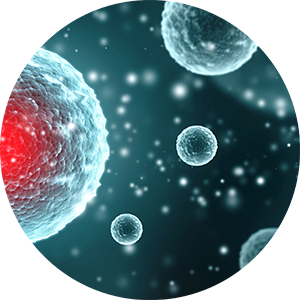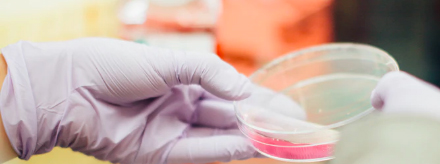Minimal-invasive in-vitro chemosensitivity testing
Cancer is an extremely heterogeneous disease. Chemotherapies do not respond in the same way in every patient. chemo-scale uses a blood sample to examine the effectiveness of chemotherapies on an individual patient. The probability of successful therapy can be significantly increased in certain cases, and treatment failure can largely be avoided.

About chemo-scale
However, conventional ‘Standard of Care’ approach does not take into consideration the overall architecture of a particular patient‘s tumour and consequently, patients could suffer due to failed therapies or aggressive relapse. It is, thus, imperative that the characteristics of the tumour are studied comprehensively before deciding the treatment plan, which has to be personalised to individual patients and their disease.
DCG has proven the clinical relevance of chemo-scale with trials comprising more than 5.000 patients.
chemo-scale is an analysis of tumour cells to provide drug efficacy and resistance guidance for chemotherapy.
With chemo-scale analysis, we minimise the risks of therapy failure for the patient - saving money, reducing 'trail and error' and most importantly, intensifying the attack on the patient's cancer, not the patient.
- chemo-scale directly tests the effect of chemotherapy / anti-cancer drugs on the patient's tumour cells. It helps to customise the treatment plan according to sensitivity and resistance patterns of tumour cells.
- With this information, the physician and the patient can choose the most effective chemotherapy from the available options.
- chemo-scale is perfomed on cells taken from a fresh biopsy sample of the tumour or circulating tumour associated cells (C-ETACs) isolated from peripheral blood. A control analysis is included.
- Analysing the chemosensitivity pattern of circulating tumour associated cells and tumour tissue derived cells of the same patient, we observed a concordance of 93.7%.
chemo-scale is particularly recommended for cancer patients ...

... who are newly diagnosed with a solid tumour such as stomach, pancreas, breast etc.

... where cancer has relapsed
Analysis Unravels
-
Results in percentages
chemo-scale reveals cytotoxic chemotherapy drug efficacy.
-
Ranking of test results
In the TR the drugs are listed by hierarchy.
-
Broad range of substances
Analysis is carried out for single drugs and on request also for repurposed drugs, biologicals and drug combinations.
Sample requirement

20 ml blood in EDTA tubes
Turn Around Time (TAT):
8 - 10 days from receipt of the sample
FAQ
chemo-scale is a powerful analysis performed on live tumour cells. It reveals which drugs or combinations will kill the cancer of an individual patient more effectively.
Not all drugs work the same on all patients. Some drugs may not prove benefical for the patient and waste valuable time and resources at a critical point in treatment. With chemo-scale there is a way to know how effective the chemotherapy will be, before starting the treatment. Comparing the efficacy of chemoresistency profile with the radiological response focussing on disease progression, we found a concordance of 87.0%.
- Commonly available molecular tests provide information mainly about targeted therapy drugs, where cytotoxic chemotherapy is the most common first therapy.
- chemo-scale evaluates the actual response of cancer cells to cytotoxic chemotherapy drugs.
- The key difference between other tests and chemo-scale is, we use a different approach to identify the relevant cells in a short-term culture thus enabling accurate advise.
- It is clinically validated with more than 5.000 patients.

